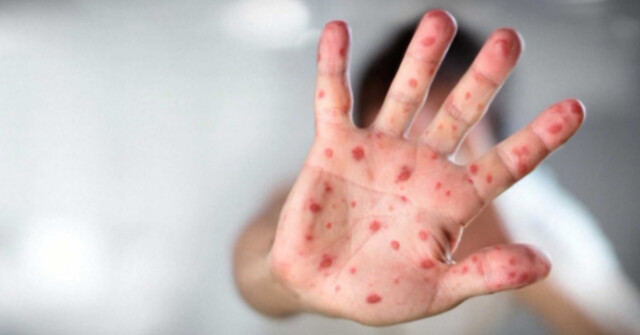I still feel the wind-bitten chill from yesterday’s ferry crossing as I stand outside the Kelowna Public Health Centre. Inside, the waiting room is busier than usual, filled with parents clutching their children’s health records and anxious faces. Dr. Silvina Mema, the Interior Health medical health officer I’m here to interview, has been working overtime since measles arrived in the region.
“We’ve identified new measles cases in Kelowna, Kamloops, Salmon Arm, and Nelson,” Dr. Mema confirms, her voice steady but her exhaustion visible in the shadows beneath her eyes. “This brings our total to seventeen confirmed cases since February, which is significant considering B.C. typically sees very few cases annually.”
The outbreak began with imported cases – travelers returning from countries experiencing their own measles surges – but has since taken root in communities across Interior B.C. What makes this particularly concerning is the disease’s extraordinary contagiousness.
“One person with measles can infect up to 18 unvaccinated people in a shared space,” explains Dr. Mema. “The virus remains viable in the air for up to two hours after an infected person has left the room.”
At Okanagan College’s campus café, I meet Leila Sarmadi, a nursing student who’s been volunteering at vaccination clinics. Over herbal tea, her hands wrapped around the mug for warmth, she describes the misinformation she’s encountered.
“People forget that before widespread vaccination, measles killed millions of children worldwide,” Sarmadi says. “When I talk to vaccine-hesitant parents, I try to gently remind them that the immunity gaps we’re seeing now aren’t just statistics – they’re vulnerable children.”
According to the BC Centre for Disease Control, vaccination rates in some Interior communities have fallen below 80% – well short of the 95% needed for effective community protection. The reasons are complex, ranging from complacency to active refusal, often fueled by online misinformation.
In the sunlit corner of a Nelson community center, I join Jeanette McLean, an elementary school principal whose school confirmed a case last week. The walls around us are covered in children’s artwork – a stark reminder of who stands most vulnerable.
“We had to send home 27 unvaccinated or under-vaccinated children,” McLean explains, scrolling through parent emails on her phone. “Some families scrambled to find childcare for the 21-day exclusion period. Others rushed to get their children vaccinated, but of course, that doesn’t provide immediate immunity.”
The outbreak’s economic impact extends beyond healthcare costs. Parents miss work to care for excluded children or those who become ill. Small businesses in affected communities report decreased foot traffic as people avoid public spaces.
Karin Goodison, Health Canada’s regional medical officer, emphasized in our phone conversation that measles isn’t a mild childhood disease. “About one in five people with measles will be hospitalized. One in 1,000 develops encephalitis, which can cause permanent brain damage. And for every 3,000 cases, there’s typically one death.”
The current outbreak shows how quickly vaccine-preventable diseases can resurge when immunity gaps form. Provincial data shows that while overall vaccination rates remain relatively high, certain communities have clusters where rates have fallen dramatically in recent years.
In Salmon Arm, I visit a busy community clinic where nurses administer MMR vaccines to a steady stream of people. Dr. Teresa Tam, a family physician who’s worked in the community for 15 years, takes a break between patients to talk with me.
“We’re seeing parents who delayed vaccination during the pandemic now catching up,” she says. “But we’re also seeing adults who didn’t realize they needed boosters or weren’t sure of their immunity status.”
The clinic has extended its hours to accommodate the surge in demand. In the waiting room, I meet Marianne Chen, cradling her six-month-old daughter, too young for the standard MMR vaccine that typically starts at 12 months.
“We rely on everyone else being vaccinated to protect her,” Chen says, adjusting her baby’s hat. “When I hear about parents choosing not to vaccinate, it feels personal – like they’re making a choice that directly impacts my baby’s safety.”
Interior Health has responded by opening additional vaccination clinics and extending hours at existing ones. They’ve also launched a campaign urging people to check their immunization status, particularly those born between 1970 and 1994 who may have received only one dose instead of the currently recommended two.
As I pack up to leave Kelowna, heading next to the Nelson area to speak with affected families there, Dr. Mema offers a parting thought.
“The most frustrating aspect of this outbreak is its preventability,” she says, standing in the late afternoon sun outside the health center. “Every case represents a breakdown in our collective immunity. But there’s hope in how communities are responding now – coming together, getting vaccinated, protecting each other.”
On the drive to Nelson, mountains rising around me and spring’s first tentative green appearing on the hillsides, I think about how diseases like measles reveal the delicate interdependence of our communities. In the push for individual choice, sometimes we forget how deeply our health decisions affect one another – especially those most vulnerable among us.






